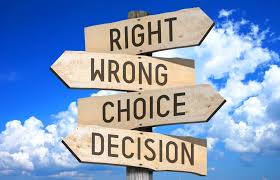Normative Decision Making: Making Choices Based on Values and Standards
When it comes to decision making, there are various approaches that individuals employ. One such approach is normative decision making, which involves making choices based on established norms, values, and standards.
Normative decision making is rooted in the belief that decisions should be guided by a set of ethical principles or social norms. This approach emphasizes the importance of considering what is considered right or wrong, good or bad, and socially acceptable or unacceptable within a particular context.
At its core, normative decision making involves evaluating options based on moral and ethical considerations. It requires individuals to reflect on their personal values and standards as well as the societal norms that shape their decisions. By doing so, individuals can align their choices with what they believe to be morally right or socially desirable.
One key aspect of normative decision making is the consideration of long-term consequences. Instead of focusing solely on short-term gains or immediate gratification, this approach encourages individuals to think about the broader impact of their decisions. By taking into account potential outcomes and considering the well-being of others, normative decision makers aim to make choices that promote fairness, justice, and overall societal welfare.
Normative decision making also involves seeking out expert opinions and consulting established guidelines or frameworks. This approach recognizes that no individual has all the knowledge or expertise needed to make fully informed decisions. By gathering information from trusted sources and relying on established standards, normative decision makers can make more informed choices that are consistent with prevailing ethical principles.
However, it’s important to note that normative decision making is not without its challenges. Different cultures, religions, and societies may have varying sets of norms and values. What may be considered morally acceptable in one context might be viewed differently elsewhere. Additionally, conflicting norms or values can sometimes make it difficult for individuals to reach a consensus on what constitutes the “right” decision.
Despite these challenges, normative decision making offers a valuable framework for individuals and organizations to navigate complex choices. By considering ethical principles, societal norms, and long-term consequences, individuals can make decisions that align with their values and contribute to the betterment of society.
In conclusion, normative decision making involves making choices based on established norms, values, and standards. It emphasizes the importance of ethical considerations, long-term consequences, and expert opinions. By employing this approach, individuals can make decisions that are morally sound, socially acceptable, and in line with their personal values.
A Comprehensive Guide to Normative Decision Making: FAQs, Advantages, Factors to Consider, Improvement Tips, and Practical Examples
- What is normative decision making?
- How does normative decision making work?
- What are the advantages and disadvantages of normative decision making?
- What factors should be considered when using normative decision making?
- How can I improve my ability to make decisions using normative decision making?
- What are some examples of how to apply normative decision making in practice?
What is normative decision making?
Normative decision making refers to the process of making choices based on established norms, values, and standards. It involves evaluating options and selecting the one that aligns with ethical principles or social norms. This approach emphasizes considering what is considered right or wrong, good or bad, and socially acceptable or unacceptable within a particular context.
Normative decision making takes into account personal values as well as the societal norms that shape decision-making processes. It involves reflecting on moral and ethical considerations when evaluating choices. By doing so, individuals aim to make decisions that are consistent with their own beliefs and the prevailing standards of their community or society.
One key aspect of normative decision making is considering the long-term consequences of choices. Instead of focusing solely on short-term gains or immediate gratification, this approach encourages individuals to think about the broader impact of their decisions. By taking into account potential outcomes and considering the well-being of others, normative decision makers strive to make choices that promote fairness, justice, and overall societal welfare.
Normative decision making also involves seeking out expert opinions and consulting established guidelines or frameworks. It recognizes that no individual has all the knowledge or expertise needed to make fully informed decisions. By gathering information from trusted sources and relying on established standards, normative decision makers can make more informed choices that are consistent with prevailing ethical principles.
It’s important to note that normative decision making can vary across different cultures, religions, and societies. What may be considered morally acceptable in one context might be viewed differently elsewhere. Conflicting norms or values can sometimes make it challenging for individuals to reach a consensus on what constitutes the “right” decision.
Despite these challenges, normative decision making offers a valuable framework for individuals and organizations to navigate complex choices. By considering ethical principles, societal norms, and long-term consequences, individuals can make decisions that align with their values and contribute to the betterment of society.
How does normative decision making work?
Normative decision making operates through a systematic process that incorporates ethical principles, societal norms, and personal values. Here’s a breakdown of how normative decision making works:
- Identifying the Decision: The first step is to clearly define the decision that needs to be made. This could range from personal choices like career decisions or ethical dilemmas to organizational decisions such as policy changes or resource allocations.
- Gathering Information: Normative decision making requires gathering relevant information about the options available and their potential consequences. This includes understanding the context, considering different perspectives, and seeking expert opinions.
- Identifying Ethical Principles and Standards: Normative decision makers reflect on their personal values and consider established ethical principles or standards that are relevant to the decision at hand. These principles could include fairness, justice, honesty, integrity, or respect for autonomy.
- Evaluating Options: Each option is evaluated against the identified ethical principles and standards. Normative decision makers assess whether an option aligns with their values and whether it promotes overall societal welfare.
- Considering Long-Term Consequences: Normative decision making involves looking beyond immediate outcomes and considering the potential long-term consequences of each option. This includes assessing the impact on individuals, communities, and future generations.
- Balancing Conflicting Values: In some cases, normative decision makers may encounter conflicting values or norms that make it challenging to reach a clear-cut choice. They must weigh different considerations and find a balance that aligns with their core values while also considering societal expectations.
- Consulting Guidelines or Frameworks: Normative decision making often involves consulting established guidelines or frameworks that provide guidance in specific domains such as law, medicine, or business ethics. These resources help individuals navigate complex decisions by providing ethical frameworks or codes of conduct.
- Making a Decision: Based on careful evaluation and consideration of all relevant factors, normative decision makers select an option that best aligns with their values, ethical principles, societal norms, and long-term consequences.
- Reflecting on the Decision: After making a decision, normative decision makers take time to reflect on the choice they have made. They assess whether it was consistent with their values and evaluate the outcomes to further refine their decision-making process in the future.
Normative decision making is an iterative process that allows individuals to make choices that are ethically sound and socially responsible. It promotes thoughtful consideration of values, principles, and consequences to ensure that decisions are aligned with personal beliefs while also contributing positively to society as a whole.
What are the advantages and disadvantages of normative decision making?
Advantages of Normative Decision Making:
Ethical and Moral Guidance: Normative decision making provides a framework for individuals to make choices that align with their personal values and ethical principles. It helps individuals prioritize moral considerations and make decisions that are morally sound.
Consistency and Predictability: By adhering to established norms and standards, normative decision making promotes consistency in decision making. This can lead to predictability in outcomes, as decisions are guided by a set of principles or guidelines.
Long-term Perspective: Normative decision making encourages individuals to consider the long-term consequences of their choices. By focusing on broader societal welfare and considering potential outcomes, this approach helps individuals make decisions that have a positive impact beyond immediate gains.
Expert Opinion and Guidance: Normative decision making involves seeking out expert opinions and consulting established guidelines or frameworks. This allows individuals to benefit from the knowledge and expertise of others, leading to more informed decisions.
Disadvantages of Normative Decision Making:
Cultural Variations: Different cultures, religions, and societies may have varying sets of norms and values. What may be considered morally acceptable in one context might be viewed differently elsewhere. This can create challenges when trying to apply normative decision making universally.
Conflicting Norms or Values: In some cases, there may be conflicting norms or values that make it difficult for individuals or groups to reach a consensus on what constitutes the “right” decision. This can lead to disagreements or challenges in implementing normative approaches.
Lack of Flexibility: Normative decision making relies on established norms and standards, which may not always account for unique circumstances or evolving situations. This lack of flexibility can limit creative problem-solving or adaptation to changing conditions.
Potential Bias: Even within normative frameworks, there is the risk of bias influencing decision making. Personal biases or subjective interpretations of norms can impact how decisions are made, potentially leading to unfair or unjust outcomes.
It is important to note that the advantages and disadvantages of normative decision making may vary depending on the specific context and individual perspectives. Balancing ethical considerations with practicality and considering the potential limitations of normative approaches can help individuals make more informed decisions.
What factors should be considered when using normative decision making?
When using normative decision making, there are several factors that should be considered. These factors help guide individuals in making choices that align with ethical principles and social norms. Here are some key considerations:
- Ethical Principles: Normative decision making involves evaluating options based on ethical principles such as fairness, justice, honesty, and respect for others. Consider how each potential choice aligns with these principles and whether it promotes the greater good.
- Personal Values: Reflect on your own values and beliefs. What matters to you? What are your priorities? Understanding your personal values can help guide your decision-making process and ensure that your choices are in line with what you hold dear.
- Social Norms: Take into account the prevailing social norms within your community or society. Consider what is considered acceptable or unacceptable behavior within the context of your decision. Adhering to societal expectations can help maintain harmony and avoid conflicts.
- Long-Term Consequences: Think beyond immediate outcomes and consider the long-term consequences of each option. How might your decision impact others? Will it have any unintended negative effects? Evaluating potential consequences helps make decisions that are sustainable and beneficial in the long run.
- Expert Opinions: Seek out expert advice or consult established guidelines when making complex decisions. Experts can provide insights based on their knowledge and experience, helping you make more informed choices that align with established standards or best practices.
- Stakeholder Perspectives: Consider the perspectives of those who will be affected by your decision, including stakeholders such as employees, customers, or community members. Understanding their needs and concerns can help you make decisions that consider their well-being.
- Legal Requirements: Ensure that your decision complies with applicable laws and regulations. Consider any legal obligations or restrictions that may impact your choices.
- Cultural Sensitivity: Recognize cultural differences when making decisions in diverse settings or when dealing with individuals from different backgrounds. Be respectful and mindful of cultural norms and values that may influence the decision-making process.
- Balancing Conflicting Values: Sometimes, different ethical principles or social norms may conflict with each other. In such cases, it is important to carefully weigh the pros and cons, considering the potential impact on various stakeholders and striving for a balanced approach.
It is worth noting that these factors are not exhaustive, and the specific factors to consider may vary depending on the nature of the decision and the context in which it is being made. By taking these considerations into account, individuals can make more informed decisions that align with ethical principles, social norms, and personal values.
How can I improve my ability to make decisions using normative decision making?
Improving your ability to make decisions using normative decision making involves developing a deeper understanding of ethical principles, societal norms, and the factors that influence decision making. Here are some steps you can take to enhance your normative decision-making skills:
- Reflect on your values: Take the time to identify and clarify your personal values. What do you consider important in life? What ethical principles do you prioritize? Understanding your own values will provide a foundation for aligning your decisions with what you believe is morally right.
- Study ethical theories: Familiarize yourself with different ethical theories such as utilitarianism, deontology, and virtue ethics. Learn about their key principles and how they shape decision making. This knowledge will help you evaluate choices from different moral perspectives.
- Stay informed: Keep up with current events, social issues, and evolving norms within your community or society at large. Reading books, articles, or engaging in discussions about ethics and societal values can broaden your understanding of what is considered morally acceptable or unacceptable.
- Seek diverse perspectives: Engage in conversations with people who have different backgrounds, beliefs, and perspectives. This exposure to diverse viewpoints can challenge your assumptions and expand your understanding of ethical considerations in decision making.
- Consult experts: When facing complex decisions, seek advice from professionals or experts who specialize in the relevant field. Their expertise can provide valuable insights and help you navigate ethical dilemmas more effectively.
- Consider long-term consequences: Train yourself to think beyond immediate outcomes and consider the potential long-term effects of your decisions on yourself and others. Reflect on how choices may impact different stakeholders involved or broader societal well-being.
- Use decision-making frameworks: Familiarize yourself with established decision-making frameworks like cost-benefit analysis or ethical decision-making models such as the four principles approach (autonomy, beneficence, non-maleficence, justice). These frameworks provide structured approaches for evaluating choices and considering ethical implications.
- Reflect and learn from past decisions: Regularly evaluate your past decisions and reflect on the outcomes. Consider whether your choices aligned with your values and the impact they had. Learn from any mistakes or successes to refine your decision-making skills moving forward.
Remember, improving normative decision making is an ongoing process that requires self-reflection, continuous learning, and an open mind. By consciously integrating ethical considerations, societal norms, and expert opinions into your decision-making process, you can enhance your ability to make choices that align with your values and contribute positively to the world around you.
What are some examples of how to apply normative decision making in practice?
Applying normative decision making in practice involves considering ethical principles, societal norms, and long-term consequences when making choices. Here are some examples of how this approach can be applied:
- Business Ethics: In the corporate world, normative decision making can guide leaders in making ethical choices. For instance, a company faced with a decision about whether to engage in environmentally harmful practices may consider the long-term consequences on the environment and society. By aligning their choices with ethical principles and societal expectations, they can make decisions that prioritize sustainability and social responsibility.
- Healthcare: Normative decision making plays a crucial role in healthcare settings. For example, doctors often face difficult decisions when it comes to allocating limited resources or determining treatment options for patients. By considering principles such as fairness, beneficence, and respect for autonomy, healthcare professionals can make decisions that uphold patient welfare while adhering to established ethical guidelines.
- Public Policy: When formulating public policies or laws, normative decision making is essential. Policymakers need to consider societal norms and values to ensure that their decisions align with the expectations of the community they serve. For instance, when legislating on topics like education, healthcare access, or environmental protection, policymakers should take into account public opinion and ethical considerations to create policies that benefit society as a whole.
- Personal Relationships: Normative decision making is not limited to professional contexts; it can also be applied in personal relationships. For example, when faced with a conflict between personal desires and moral values within a relationship or friendship, individuals can use normative decision making to evaluate their choices. By considering what is morally right or socially acceptable within the context of their relationship dynamics and values, individuals can make decisions that uphold integrity and respect.
- Legal System: The legal system relies on normative decision making to establish laws and determine judgments in court cases. Judges must consider legal precedents, societal norms, and ethical principles when interpreting the law and making decisions that have far-reaching consequences. By applying normative decision making, the legal system aims to ensure fairness, justice, and the protection of individual rights.
These examples demonstrate how normative decision making can be applied across various domains, guiding individuals and organizations to make choices that are ethically sound, socially responsible, and aligned with their values and societal expectations.




